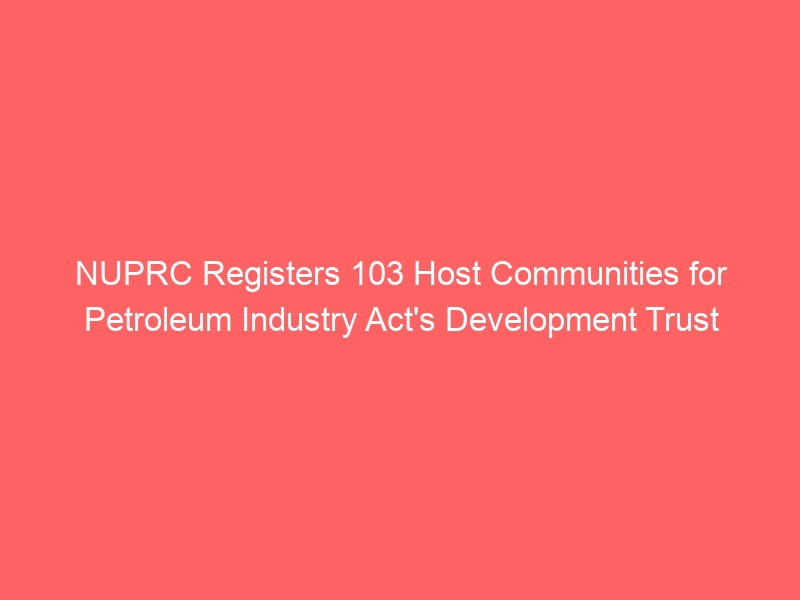The Nigerian Upstream Petroleum Regulatory Commission (NUPRC) has registered 103 communities to benefit from the three per cent Host Communities Development Trust (HCDT) established by the Petroleum Industry Act.
Gbanga Komolafe, the Chief Executive of NUPRC, highlighted that the HCDT has commenced operations, which have already begun to restore investor confidence in the industry.
He made this announcement on Tuesday at the Annual PETAN Sub-Saharan Africa International Petroleum Exhibition and Conference (SAIPEC), held under the theme ‘Pivoting the Nigerian Upstream Oil and Gas Industry in the Fast Evolving Global Energy Landscape.’
The HCDT is a trust for the benefit of the host communities to which oil and gas operators (called “settlors”) are obliged to make annual contributions based on three per cent of their yearly operating expenditure.
The HCDT is expected to improve the quality of life of the host communities’ population, and improve accountability in the management of development funds.
Komolafe said, “Let me at this point reassure willing investors that implementation of the Host Communities Development Trust (HCDT) provisions of the PIA has restored confidence and created social inclusion for the host communities by the operators.
“In this regard, the Commission, in carrying out its oversight roles, has registered a total of One Hundred and Three (103) HCDTs, and has deployed an intelligent digital, platform for reporting, monitoring and ensuring transparent administration of the HCDTs for sustainable operations in the Nigerian communities.”
The NUPRC boss said the future of the Nigerian petroleum industry is one that should assure for the utilization of hydrocarbon resources for shared prosperity, energy accessibility, affordability, sustainability, security and energy independence.
According to Komolafe, investment opportunities have been created through intensified efforts towards eliminating flared gas, methane abatement and reduction of fugitive gas emissions.
The Commission’s CE said, “As part of the efforts to deepen our gas market and ensure decarbonisation of upstream operations, the Commission recently awarded forty-nine (49) flare sites to successful bidders for flare gas commercialisation through the Nigerian Gas Flare Commercialization Program (NGFCP).
“Through this initiative, more gas would be available for domestic utilization as Liquefied Petroleum Gas (LPG), feedstock for power generation plants, fertilizer plants, petrochemicals and export.
“Further investment opportunities are also available in the licencing rounds, which would be conducted more frequently in line with the provisions of the PIA and the relevant Regulations.
“In addition, there are also huge opportunities in Seismic acquisition on multi-client basis, development of deeper hydrocarbon opportunities, etc. There are also business prospects in carbon-pricing system currently being stewarded by the Commission. Each of these areas provides a unique entry point for willing investors.”
The NUPRC boss noted that the commission has put in efforts to reposition the upstream oil and gas industry through a strategic plan that aligns with the mandate of the PIA.
Kololafe said in furtherance of the strategic plan, the commission would undertake regulatory activities, and implement strategic initiatives articulated in the NUPRC Regulatory Action Plan (RAP) for 2024 and the Near Term.
The RAP is centered around ensuring regulatory certainty and predictability, vacating entry competitiveness, barriers, deepening promoting transparency global and accountability, value creation and monitoring, host community and environmental sustainability as well as acceleration of field developments.
He said, “The Commission is confident of fostering a resilient and sustainable upstream oil and gas industry in Nigeria through effective collaborations with industry stakeholders while focusing on twenty-four (24) cardinal areas of the RAP benchmarked against international best practices.
“Despite the challenges posed by the climate calls, we are also confident that investors will leverage sustainability mandates in the Petroleum Industry Act (2021) as well as its generous fiscal incentives which include: zero hydrocarbon tax for deep water developments, reduced royalty rates based on production and terrains, and tax consolidation provisions amongst others.”












